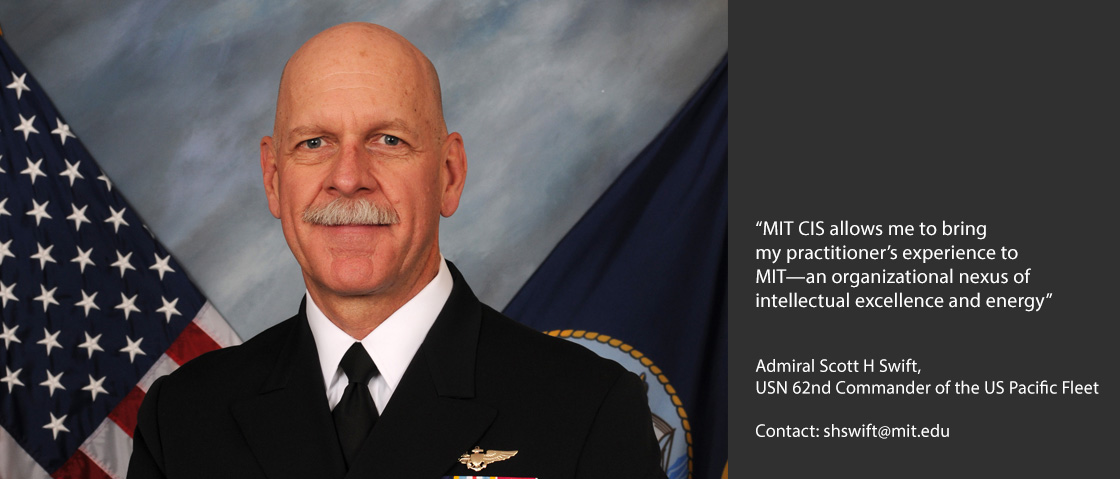The former commander of the Pacific Fleet brings extensive military experience to bear on world-class security studies at MIT
Adm Scott H Swift, former commander of the US Pacific Fleet, joins the MIT Center for International Studies (CIS) as a Robert E Wilhelm Fellow. Swift arrives at MIT on August 1, 2018. He retired from the US Navy on July 1, 2018.
Swift brings immeasurable insights and perspectives as a military leader with more than 40 years of service in the US Navy. He was selected for admiral in 2006 and was assigned as the deputy commander of Naval Forces Central Command, Bahrain. He traveled throughout the region from Djibouti to Iraq, Afghanistan, and Pakistan. In 2010, after a tour as Carrier Strike Group commander, he was assigned as the director of operations on the Pacific Command staff. During this time, he helped develop and implement the US response to the Tōhoku earthquake and tsunami in Japan, known as Operation Tomodachi. From 2011-2013, he was assigned as the commander of the Seventh Fleet, Yokosuka, Japan. He traveled extensively and met with leaders throughout the Indo-Pacific region. After a short tour in the Pentagon in 2015, he was assigned as the commander of the US Pacific Fleet and built upon his earlier experience in the region.
“MIT CIS allows me to bring my practitioner’s experience to MIT—an organizational nexus of intellectual excellence and energy. Working with faculty and students, my aim is to contribute to, and learn from, the process of developing a deeper understanding of the dynamics that are driving the changing relations between international powers, great and small,” said Swift.
Swift’s work at MIT will provide the basis for broadly informed US policy proposals that address the key challenges facing US and global security.
“Adm. Swift brings a wealth of knowledge and experience to the CIS research community,” said Richard Samuels, director of CIS and Ford International Professor of Political Science. “It is a great honor to welcome him on behalf of our faculty and students. We hope he finds his time here equally rewarding.”
A generous gift from Robert E Wilhelm supports the Center's Wilhelm fellowship. The fellowship is awarded to individuals who have held senior positions in public life and is open, for example, to heads of non-profit agencies, senior officials at the State Department or other government agencies, including ambassadors, or senior officials from the UN or other multilateral agencies. Previous Wilhelm Fellows include: Honorable James E Baker, former chief judge of the US Court of Appeals for the Armed Forces; Lourdes Melgar, Mexico's former deputy secretary of energy for hydrocarbons; Paul Heer, former national intelligence officer for East Asia; Joel Brenner, former NSA inspector general; Ambassador Barbara Bodine; Adm. William Fallon; and Yukio Okamoto, a special advisor to the prime minister of Japan.



